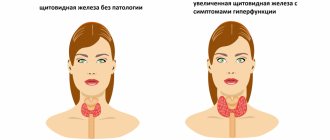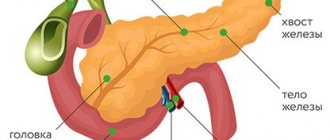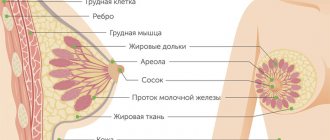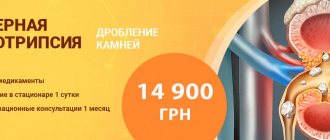The thyroid gland is an endocrine gland that performs the same function in men as in women, namely producing the hormones thyroxine (T4) and triiodothyronine (T3). Most of the secreted T4 in the body is converted to T3. Thyroid hormones play an important role in regulating human metabolism. They regulate body temperature, mood, heart rate, digestion and much more.
Men experience the same thyroid diseases as women, only the frequency is much less common. And some symptoms are different, so often even they don't think thyroid dysfunction is a potential cause.
Thyroid diseases in men - causes
The content of the article
Thyroid diseases cause:
- Hashimoto's disease as the most common autoimmune cause of hypothyroidism (decreased thyroid function);
- Graves' disease as the most common autoimmune cause of hyperthyroidism (increased thyroid function);
- lithium, amiodarone, interferons can cause hypothyroidism;
- hyperactive nodules in the thyroid gland as a cause of hyperthyroidism;
- thyroid cancer;
- Pituitary adenoma is a benign tumor in the pituitary gland of the brain, which regulates the secretion of thyroid hormones;
- selenium deficiency in the body;
- low testosterone as a trigger, but also as a consequence of thyroid disease.
Consequences of deviation from the norm
The normal functioning of almost all body systems depends on the condition of the thyroid gland. The production of TSH by the pituitary gland is directly related to the production of T4 and T3. If the concentration of T4 and T3 is low, TSH in men increases. With low levels of T4 and T3, the concentration of TSH in the blood will decrease due to deterioration in synthesis.
If the analysis shows increased production of TSH with reduced or normal concentrations of T3, T4, this condition is called hypothyroidism. If thyrotropin is low, this is a signal of hyperthyroidism.
Any deviations in the production of thyroid-stimulating hormones from the norm indicate changes occurring in the pituitary gland, thyroid gland or other organs. Men are usually prescribed a comprehensive analysis to study the amount of TSH, T3, T4 in the blood, which helps to establish the cause of simply feeling unwell or the appearance of various diseases.
Symptoms of thyroid disease in men
Symptoms of hyperthyroidism:
- weight loss;
- anxiety;
- bulging eyes,
- tremor;
- irritability;
- diarrhea;
- hair loss;
- frequent mood swings;
- gynecomastia (breast enlargement).
The clinical picture of hypothyroidism looks somewhat different:
- slow metabolism (metabolism);
- weight gain;
- feeling cold;
- forgetfulness;
- depression;
- fatigue;
- dry skin;
- constipation;
- loss of will;
- hair loss, slow beard growth;
- joint and muscle pain;
- decreased sex drive;
- infertility;
- low testosterone levels;
- erectile disfunction;
- delayed ejaculation.
The last few of these symptoms are specific to men. Therefore, thyroid disease should not be neglected in case of sexual problems or infertility.
Treatment of thyroid diseases
Treatment varies depending on whether you have symptoms of an overactive or underactive thyroid.
In case of hyperthyroidism
Treatment begins with antithyroid therapy until hormone levels return to a constant normal level. Sometimes it is necessary to remove the thyroid gland in one of two ways:
- radioactive iodine, which destroys its tissues;
- thyroidectomy – surgical removal of part or all of the thyroid gland.
Then it is necessary to carry out hormone replacement therapy, since the body is in a state of hypothyroidism.
As noted, hypothyroidism is treated with ongoing hormone replacement therapy in the form of a synthetic form of the T4 hormone.
At the beginning of treatment, it is necessary to be patient until everything stabilizes, although the administration of the drug can dramatically improve the patient's life, especially sexual discomfort.
Single numbers for recording:
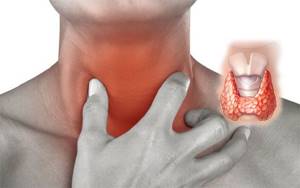
Thyroid
Structure, functions and significance of the thyroid gland
The thyroid gland (glandula thyroidea) is an endocrine gland, part of the endocrine system, which synthesizes a number of hormones necessary to maintain homeostasis in the body.
The thyroid gland (colloquially “thyroid gland”) is a symmetrical organ, consisting of two lobes and an isthmus. The right and left lobes are adjacent directly to the trachea, the isthmus is located on the anterior surface of the trachea. Some authors separately identify the pyramidal lobe in the thyroid gland. In a normal (euthyroid) state, the mass of the thyroid gland ranges from 20 to 65 g, and the size of the lobes depends on gender and age characteristics and can vary within a fairly wide range. During puberty, the size of the thyroid gland mass increases, and in old age, accordingly, it decreases. During pregnancy, women also experience a temporary increase in the size of the thyroid gland, which goes away on its own, without treatment, within 6-12 months after birth.
The thyroid gland synthesizes two iodine-containing hormones - thyroxine (T4) and triiodothyronine (T3), and one peptide hormone - calcitonin. In the tissue of the thyroid gland, the amino acid tyrosine accumulates, which is deposited and stored in the form of a protein - thyroglobulin (a building material for the synthesis of thyroid hormones). In the presence of molecular iodine and the activation of the enzyme thyroid peroxidase (TPO), the hormones T3 and T4 are synthesized. Thyroxine (T4) and triiodothyronine (T3) are synthesized in the apical part of the thyroid epithelium. Calcitonin (thyrocalcitonin) is produced by the parathyroid glands, as well as the C-cells of the thyroid gland.
Biosynthesis of thyroid hormones.
Thyroid hormones are the main regulators of homeostasis in the human body. With their direct participation, the main metabolic processes occur in tissues and organs; formation of new cells and their structural differentiation takes place, as well as genetically programmed death of old cells (apoptosis). Another equally important function of thyroid hormones in the body is to maintain a constant body temperature and produce energy (the so-called calorigenic effect). Thyroid hormones regulate tissue oxygen consumption, oxidation and energy production processes in the body, and also control the formation and neutralization of free radicals. Throughout life, thyroid-stimulating hormones influence the mental, mental and physical development of the body. Hormone deficiency at an early age leads to growth retardation and can cause bone tissue diseases, and their deficiency during pregnancy significantly increases the risk of cretinism in the unborn child due to underdevelopment of the brain during the prenatal period. Thyroid hormones are also responsible for the normal functioning of the immune system - they stimulate the cells of the immune system, the so-called. T cells, which the body uses to fight infection.
Prevalence of thyroid diseases
According to the World Health Organization (WHO), among endocrine disorders, thyroid diseases occupy second place after diabetes mellitus. More than 665 million people in the world have endemic goiter or suffer from other thyroid pathologies; 1.5 billion people are at risk of developing iodine deficiency diseases. Moreover, according to statistics, the increase in the number of thyroid diseases in the world is 5% per year.
Among the possible causes of the development of thyroid pathologies, one can primarily highlight a poor environmental situation, a lack of iodine and other nutrients in the diet, as well as increasingly common genetic disorders.
Diagnosis of thyroid diseases
To select the correct treatment, diagnosis of patients with thyroid diseases should include physical, instrumental and laboratory methods for assessing its morphological structure and functional activity. For example, by palpation (tactile palpation with fingers) of the thyroid gland, you can determine its size, the consistency of the thyroid tissue and the presence or absence of nodules. Today, the most informative laboratory method for determining the concentration of thyroid hormones in the blood is an enzyme-linked immunosorbent assay, carried out using standard test kits.
Ultrasound examination (ultrasound) of the thyroid gland.
Modern methods for assessing the structure of the thyroid gland also include ultrasound diagnostics (US), computed tomography (MRI), thermography and scintigraphy. These methods make it possible to obtain information about the size of the organ and the nature of accumulation of the radiocontrast agent in different parts of the gland. Using a fine-needle aspiration biopsy (FNA), thyroid cells are collected for analysis and then studied.
It should be noted that with all the variety of methods for laboratory monitoring of the thyroid gland, the fastest diagnostic methods are tests to determine the content of free/bound forms of hormones T3 and T4, antibodies to thyroglobulin (AT-TG) and to thyroid peroxidase (AT-TPO), and also the level of thyroid-stimulating hormone (TSH) in the blood plasma. In addition, sometimes a type of analysis is performed to determine iodine excretion in urine. This study allows us to determine whether there is a connection between thyroid disease and iodine deficiency.
Symptoms of thyroid diseases
Hypothyroidism (underfunction) is a condition characterized by decreased levels of thyroid hormones, occurring in 19 out of 1000 women and 1 out of 1000 men. Often hypothyroidism is not detected for a long time, because Symptoms of the disease develop very slowly and patients do not complain about their health status. In addition, the symptoms of hypothyroidism can be nonspecific, and the disease can occur hidden behind the “masks” of a number of other diseases, which in turn leads to erroneous diagnosis and incorrect treatment.
With a chronic lack of thyroid hormones in the human body, all metabolic processes slow down, as a result of which the production of energy and heat decreases. Clinical symptoms of hypothyroidism development are:
- fatigue;
- weakness;
- decreased performance;
- memory impairment;
- chilliness;
- swelling;
- rapid weight gain;
- dry skin;
- dullness and brittleness of hair.
In women, hypothyroidism can cause menstrual irregularities and cause early menopause. One of the common symptoms of hypothyroidism is depression, for which patients are referred to a psychologist or psychiatrist.
Thyrotoxicosis (hyperfunction) is a clinical condition characterized by a persistent increase in the level of thyroid hormones in the blood, which leads to an acceleration of all metabolic processes in the body. Classic symptoms of tereotoxicosis are:
- irritability and short temper;
- weight loss (with increased appetite);
- rapid heartbeat (sometimes with rhythm disturbance);
- sleep disturbance;
- constant sweating;
- elevated body temperature.
Sometimes, and especially in old age, these symptoms do not appear clearly and patients associate their condition not with any disease, but with natural age-related changes in the body. For example, a feeling of heat, “hot flashes”, which are classic signs of thyrotoxicosis, can be regarded by women as manifestations of menopause.
A fairly common symptom in patients with thyroid diseases is goiter (formation of the so-called goiter) - an enlargement of the organ beyond the permissible values (the normal volume of the gland in men is 9-25 ml, in women - 9-18 ml). In the euthyroid state, the thyroid gland slightly enlarges during adolescence, also in women during pregnancy and after menopause. Depending on whether the entire organ is enlarged or only a separate part of it is enlarged, it is customary to distinguish between diffuse or nodular goiter, respectively.
Causes of development of thyroid diseases
Undoubtedly, genetic factors play an important role in the occurrence of thyroid diseases, which determine a person’s predisposition to a particular disease. But, in addition, the role of various external stress factors in the development of thyroid pathologies is undeniable:
- psycho-emotional overload;
- unbalanced diet and, as a result, a lack of vitamins and/or microelements (including iodine deficiency);
- unfavorable environmental and radiation conditions;
- infections;
- chronic diseases;
- taking certain medications, etc.
These factors are the trigger for the occurrence of thyroid diseases.
Simply put, the human body is constantly affected by certain reasons that force its thyroid gland to produce an increased or decreased amount of hormones. This leads to the fact that this organ of the endocrine system “wears out” and “fades away”, and becomes unable to synthesize the optimal amount of hormones T3 and T4 for the body’s needs. Ultimately, either chronic functional disorders of the thyroid gland develop (hypo-, hyperthyroidism), or morphological changes in its structure (formation of goiter, formation of nodules, hyperplasia, etc.).
Existing drugs and methods of treating thyroid diseases
Hormonal disorders of the thyroid gland, manifested as hyper- or hypothyroidism, are usually treated with chemotherapy drugs. The standard of treatment is the use of thyroid hormone preparations, including medications such as triiodothyronine, thyroxine, as well as their combinations and complexes with inorganic iodine (iodothyrox, thyrotom, thyrocomb).
These medications compensate for the deficiency of your own thyroid hormones and are usually used for life. This method of treating the thyroid gland is called hormone replacement therapy (HRT). Its main disadvantage is the suppression of the thyroid gland's synthesis of its own thyroid hormones, as a result of which the patient becomes dependent on hormone replacement therapy and can no longer live without pills. Other side effects of HRT include allergic reactions to synthetic hormones, heart rhythm disturbances, nervous disorders, etc.
Dentist Dimanova S.V.


